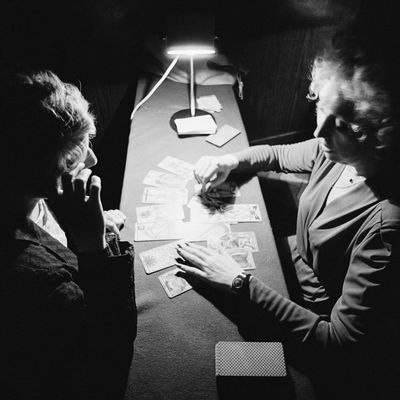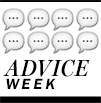
This week, the Cut is talking advice — the good, the bad, the weird, and the pieces of it you really wish you’d taken.
At 7 a.m. each day, my iPhone pings, heralding the arrival of a text from Susan Miller, beloved astrologer and chief stargazer at AstrologyZone. Do I take astrology seriously? No, not really — to me, it’s based on a “science” that’s on the doughier side of half-baked. Do I check Susan’s daily forecast for my sign anyway? Yes. I crave advice, input, and opinion of all kinds, and this morning text offers the first quick fix of a day that will be filled with other people’s opinions of what I should be doing.
I solicit input on decisions both big and small, matters both trivial and significant. “Hey, Facebook friends,” I will post, with a stock photo of a smiling blonde woman with razor-cut ends, “what do you think of this haircut?” If they like it, I will head to the salon with the photo in hand.
“You, level-headed friend I’ve known for 20-plus years, do you think it’s a good idea for me to get an MFA?” I will ask. Then I will wince as my otherwise-demure and soft-spoken friend yells “No!” across our trans-Atlantic phone connection. Just like that, I saved myself a couple of years and a whole lot of money.
You may think that extreme advice-seeking is the province of the eternally ambivalent space cadet. Quite the contrary. Left to my own devices, I’m actually quite decisive, naturally resolution-oriented. This is really the problem. In the past I’ve tended to decide things so quickly that I’ve failed to consider all my options. For instance, back in the days of the quickie mortgage, I basically impulse-bought a house in Wyoming. Having recently moved there from New York, I was so dazzled by affordable real estate, I jumped at the chance to own. What if I’d petitioned for opinions and someone suggested I rent for a couple years first? That way, when I realized, a year later, that Wyoming wasn’t a great long-term home for me, I wouldn’t have been saddled with having a house sale as part of my exit agenda. For the rashly decisive like me, Buyer’s Remorse is an extreme sport.
Realizing I needed to practice more thorough consideration, I now live like this: in a constant state of questioning. Asking around (and around and around) is my version of measuring twice and cutting once. All the opinions remind me: Slow your roll, ladygirl.
My Greek chorus of counsel is mostly made up of sensible sorts — attorneys who play devil’s advocate, friends who work as therapists, artists who speak from the soul, and agents and creatives who know the true human costs of a project. But when I’m feeling at a major crossroads, I expand the circle to include everything from a Magic 8 Ball website to Facade.com tarot-card readings. Yes, that’s crossing the line between advice-giving and fortune-telling, but as vices go, I’ll take it. Both sites are free. When I duck behind the curtains of one of those neon-lit palm-reading salons and start forking over my life savings, you can cut me off.
What we’re really looking for when we solicit advice is to know that when we feel stuck, we have more options than we thought — and to find connection. On the surface, it seems like a practical exchange, but look deeper and you’ll find that every offered directive reminds us that others have been right where we are, that we are not alone. I’ve recently had to face the agonizing truth that my mother is in her decline: Immobility. Chronic pain. Breathing trouble. Cognitive impairment. Constant trips to the emergency room for this fever or that infection. The full-on geriatric nursing-homebound works. Because I find the complexities of parental illness and mortality to be so overwhelming, I feel viscerally that the counsel must be delivered with the voice of experience. My friend Lori, an attorney working at West Point, gave me the most useful advice, having recently lost her own mother after a long illness: Make sure the caretakers remember to take breaks, get your mom’s affairs in order ahead of time, and if her health status is unclear or her care slips — as it well might — hound the doctors. Hound them, and feel no remorse about it.
Lest you assume that I’m an advice Hoover, vacuuming up all emotional energy in my immediate radius, allow to me assure you that the flow of advice isn’t unidirectional. My marriage hit a rough patch about a decade back, and when we separated for a while, the truth of the matter became impossible to hide (in part because I needed advice on how to handle it). As much as I loathed being marked as the Separated One, it did give me experience in the matter, so when friends later faced their own marital strife, they came to me. Years later, her marriage repaired, one friend told me, “I kept hearing you say to me, ‘You won’t know what it is you need to hear him say to make you want to reconcile until you hear it.’” Funny thing is, I don’t even remember saying that to her, or even having formulated it as a takeaway thought to my own personal situation. She found it useful, however, and I was glad.
Connoisseur that I am, I have some logistical advice about advice: I’ve noticed the best advice often is dispensed in the most quotidian settings. Brunches, coffee shops, stoops, balconies, museums, park benches, kitchens, and daylight hours are your best bet — basically anywhere you feel like you’re acting in an HBO comedy. Something about the everydayness acts as sugar to help the medicine go down: Situation unknown, but the world as you know it is still standing. (On the contrary, very little good advice is given in a bar and/or after 10 p.m.; brightly lit workplace cafeterias also yield sketchy results.) Those walking-down-the street heart-to-hearts may seem contrived on television, but they’re the stuff of real, remarkable, connected life: The soliciting and sharing of advice is a profound form of intimacy.
And shit on social media all you want, but if you like immediacy and dealing in bulk, Facebook and Twitter will deliver a flood of advice to sift through within minutes. One Facebook friend was distraught by her young son’s strange rash, so she posted a photo of him. Less than an hour later, several people had suggested local specialists she could consult, and ways to keep her and her son calm and comfortable while they sought answers. (Someone even correctly said it looked like he had Kawasaki disease — a crowd-sourced diagnosis that had evaded his doctors.)
As my mother’s condition worsens, I’m reminded that advice is a luxury, because there are life situations where answers aren’t possible. Some things can’t be changed, they can only be endured. But it won’t be long before I am on the other side of this stunned hurt and will return to regular life. The texts, calls, and Facebook posts will start back up, containing, in one way or another, the question: What do I do now?





